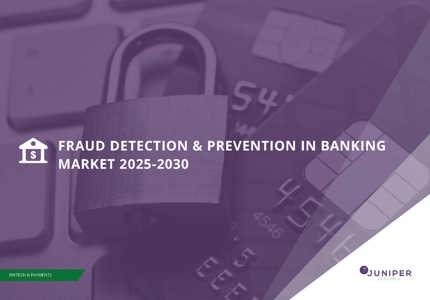Can We Have Our Speedy Payments and Keep Them Safe Too?
Fraud prevention has been in the spotlight for the past few weeks, with the ‘Chase Bank Glitch’ dominating headlines. (Spoiler alert: it was fraud). Is this case an outlier, or an example of an inevitable increase in fraud in an era which demands faster and faster payments?
The Chase Bank Glitch: What We Learned
The ‘Chase Bank Glitch’ can best be described as a resurgence in traditional cheque fraud, resulting from social media users, on platforms such as TikTok, publicising how people could earn free money by writing a cheque to themselves and depositing it in their Chase bank account, and then immediately withdrawing it in cash.
It's uncertain whether people could withdraw money faster than normal due to a technical glitch, or if they were withdrawing the ‘float’ that banks typically make available while verification occurs. But, either way, this incident shows displays the speed at which scammers will take advantage of any perceived vulnerability in a bank’s fraud prevention system. While the number of individuals involved in this fraud remains unclear, this incident underscores the need for more widespread digital financial literacy initiatives.

Source: NYPost
Looking to the future, it’s easy to assume that the new digital-first generations will be more resistant to scams. In fact, with research finding that 57% of Gen Z and 60% of millennials primarily use mobile banking, it’s easy to think of digital scams as something that only happens to the old and digitally illiterate. However, survey data from Deloitte suggests that Gen Z are three times as likely to fall for an online scam as baby boomers.
This could be for a variety of reasons: spending more money online than baby boomers do, a preference for convenience over security, or having a higher online presence that can be hacked and used to personalise scams. However, it is clear that fraud will not be phased out with the older generations, and active intervention is needed as incidences of fraud continue to increase.
Regulating Authorised Push Payments Fraud
Authorised push payments fraud involves financial scams where fraudsters use social engineering to manipulate victims into authorising real-time payments, which are difficult to reverse. UK Finance estimates this to be the most common type of financial fraud in the nation, costing the economy £459.7 million in 2023.
The UK PSR (Payments System Regulator) is launching new rules in response to this. These were initially planned to cover APP fraud to the value of £415,000, but has since been reduced to £85,000; which shifts more liability to the consumer for higher value scams. Furthermore, the legislation also allows banks to delay processing of potentially fraudulent transactions by a further 72 hours.
However, this comes in the wake of the FCA (Financial Conduct Authority) noting that some payments institutions delay payments and freeze accounts for too long, with insufficient reasoning. This highlights the challenge banks face in balancing fraud detection; false positives can disrupt customers’ cashflow, while false negatives will financially cost the bank.
These regulations, which are due to be implemented in October this year, are expected to create a motive for banks to improve their fraud detection software, possibly partnering with fintechs to do so. Machine learning-powered real-time monitoring, using forensic analysis and pattern recognition, could enable secure, instant payments by quickly identifying suspicious activity during transactions. Furthermore, this technology allows dynamic updates to fraud detection rules, adapting to emerging patterns of fraud as they arise.
However, banks may be hesitant to implement these solutions, due to potential ethical concerns. Machine learning models are known to reproduce or even amplify existing bias against groups if they are trained on biased data sets, which could lead to some demographics being under or over-flagged as fraudulent when making transactions. In order to prevent this, it is necessary to employ bias auditing and fairness-enhancing strategies when the models are being trained.
The Future of Fraud: Cryptocurrency Scams
Cryptocurrencies are a form of electronic money recorded on decentralised blockchains; offering fast, low-cost, and global payments. However, they also offer reduced protection. This speed, lack of intermediaries, and anonymity attract scammers; in 2023, Americans lost $5.6 billion dollars to cryptocurrency-related fraud.
Though crypto scam complaints make up 10% of all financial fraud reports, they represent almost 50% of total losses. Blockchain transactions are irreversible, meaning that if users are socially manipulated to authorise a cryptocurrency-based payment, it is very unlikely they will get their money back. Consumers would also not be reimbursed for these scams under current regulations, such as the previously discussed PSR regime, as they operate outside traditional financial systems.
In conclusion, real-time payments can be both fast and secure, if accompanied by real-time fraud detection. Regulations holding banks accountable for fraud could drive innovation in this area. However, the decentralised nature of the cryptocurrency industry limits regulatory impact, leaving digital financial literacy and the creation of more appealing digital payment alternatives as the best crypto fraud prevention strategies.
Lorien is a Research Analyst in the Fintech and Payments team at Juniper Research, and specialises in analysing and forecasting emerging trends and innovations in financial markets. Her latest reports have covered topics including eCommerce Payments and Modern Card Issuing Platforms.
Latest research, whitepapers & press releases
-
 ReportMarch 2026Fintech & PaymentsCross-border Payments Market: 2026-2030
ReportMarch 2026Fintech & PaymentsCross-border Payments Market: 2026-2030Our Cross-border Payments research suite provides a comprehensive and in-depth analysis of the evolving cross-border payments landscape; enabling stakeholders such as businesses, financial institutions, payment service providers, card networks, regulators, and technology infrastructure providers to understand future growth, key trends, and the competitive environment.
VIEW -
 ReportFebruary 2026Telecoms & ConnectivityMobile Messaging Market: 2026-2030
ReportFebruary 2026Telecoms & ConnectivityMobile Messaging Market: 2026-2030Juniper Research’s Mobile Messaging research suite provides mobile messaging vendors, mobile network operators, and enterprises with intelligence on how to capitalise on changing market dynamics within the mobile messaging market.
VIEW -
 ReportFebruary 2026Fintech & PaymentsKYC/KYB Systems Market: 2026-2030
ReportFebruary 2026Fintech & PaymentsKYC/KYB Systems Market: 2026-2030Our KYC/KYB Systems research suite provides a detailed and insightful analysis of an evolving market; enabling stakeholders such as financial institutions, eCommerce platforms, regulatory agencies and technology vendors to understand future growth, key trends and the competitive environment.
VIEW -
 ReportFebruary 2026Telecoms & ConnectivityRCS for Business Market: 2026-2030
ReportFebruary 2026Telecoms & ConnectivityRCS for Business Market: 2026-2030Our comprehensive RCS for Business research suite provides an in‑depth evaluation of a market poised for rapid expansion over the next five years. It equips stakeholders with clear insight into the most significant opportunities emerging over the next two years.
VIEW -
 ReportFebruary 2026Fintech & PaymentsMobile Money in Emerging Markets: 2026-2030
ReportFebruary 2026Fintech & PaymentsMobile Money in Emerging Markets: 2026-2030Our Mobile Money in Emerging Markets research report provides detailed evaluation and analysis of the ways in which the mobile financial services space is evolving and developing.
VIEW -
 ReportJanuary 2026IoT & Emerging TechnologyPost-quantum Cryptography Market: 2026-2035
ReportJanuary 2026IoT & Emerging TechnologyPost-quantum Cryptography Market: 2026-2035Juniper Research’s Post-quantum Cryptography (PQC) research suite provides a comprehensive and insightful analysis of this market; enabling stakeholders, including PQC-enabled platform providers, specialists, cybersecurity consultancies, and many others, to understand future growth, key trends, and the competitive environment.
VIEW
-
 WhitepaperMarch 2026Telecoms & Connectivity
WhitepaperMarch 2026Telecoms & ConnectivityMWC 2026: What's Next for Mobile?
Our latest whitepaper distils the most important announcements from MWC Barcelona 2026 and examines what they mean for the telecoms market over the year ahead. From network APIs and 5G monetisation to AI-RAN, direct-to-cell connectivity, and 5G-Advanced, it explains where the biggest opportunities — and challenges — will emerge next.
VIEW -
 WhitepaperMarch 2026Fintech & Payments
WhitepaperMarch 2026Fintech & PaymentsThe Transformation of Cross-border Payment Infrastructure
Our complimentary whitepaper, The Transformation of Cross-border Payment Infrastructure, examines the state of the cross-border payments market; explaining the role of key actors in transforming the cross-border payment experience, as well as the current landscape and recent developments within the cross-border payments industry.
VIEW -
 WhitepaperFebruary 2026Telecoms & Connectivity
WhitepaperFebruary 2026Telecoms & ConnectivityHow Social Media Will Disrupt Mobile Messaging Channels in 2026
Our complimentary whitepaper, How Social Media Will Disrupt Mobile Messaging Channels in 2026, explores the challenges and opportunities for operators and enterprises as social media traffic continues to increase.
VIEW -
 WhitepaperFebruary 2026Telecoms & Connectivity
WhitepaperFebruary 2026Telecoms & ConnectivityProtecting Users from Scam Ads: A Call for Social Media Platform Accountability
In this new whitepaper commissioned by Revolut, Juniper Research examines how scam advertising has become embedded across major social media platforms, quantifies the scale of user exposure and financial harm, and explains why current detection and enforcement measures are failing to keep pace.
VIEW -
 WhitepaperFebruary 2026Fintech & Payments
WhitepaperFebruary 2026Fintech & PaymentsKnow Your Agents (KYA): The Next Frontier in KYC/KYB Systems
Our complimentary whitepaper, Know Your Agents (KYA): The Next Frontier in KYC/KYB Systems, examines the state of the KYC/KYB systems market; considering the impact of regulatory development, emerging risk factors such as identity enabled fraud, and how identity and business verification is evolving beyond traditional customer and merchant onboarding toward agent-level governance.
VIEW -
 WhitepaperFebruary 2026Telecoms & Connectivity
WhitepaperFebruary 2026Telecoms & Connectivity3 Key Strategies for Capitalising on RCS Growth in 2026
Our complimentary whitepaper, 3 Key Strategies for Capitalising on RCS Growth in 2026, explores key trends shaping the RCS for Business market and outlines how mobile operators and platforms can accelerate adoption and maximise revenue over the next 12 months.
VIEW
-
Fintech & Payments
Top Three Global Leaders in Cross-border Payment Infrastructure Revealed
March 2026 -
Telecoms & Connectivity
MVNO Subscriber Revenue to Exceed $50 Billion Globally in 2030
March 2026 -
Fintech & Payments
QUBE Events is excited to bring back the 24th NextGen Payments & RegTech Forum - Switzerland
February 2026 -
Telecoms & Connectivity
OTT Messaging Apps to Exceed 5 Billion Users Globally by 2028; Driving Shift in Enterprise Communication Strategies
February 2026 -
Fintech & Payments
Calling All Fintech & Payment Innovators: Future Digital Awards Now Open for 2026
February 2026 -
Telecoms & Connectivity
Operator RCS for Business Revenue to Reach $3 Billion Globally by 2027, Growing 150% in Two Years
February 2026





















